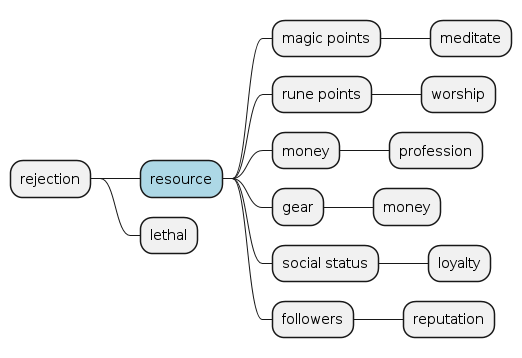Game Mechanics: Consequences and Resources
When a contest resolves, whether simple or ongoing, if the result is not to any contestants liking, they may reject it. Normally this will because they lost, but a particularly confident contestant might be unsatisfied in the level of success they achieved and try for more.
In order to do so, if they are losing, they must accept a number of consequences sufficient to bring the contest back to being a draw. If they were winning, they must give up successes instead. Either way, at this point it becomes an ongoing contest, with both sides counting as having an equal number of successes scored so far.
There are two types of consequences:
- resource loss involves the attrition of some limited resource such as time, money or magic.
- lethal consequences involve taking damage to a random hit location, following a simplified version of the RQ:G combat rules.
Resources

Any value that would normally be tracked on a character sheet, but is not an ability, may be treated as a resource. This includes:
- hit points
- magic points
- rune points
- money
- gear (supplies, food, water,
- social status
- followers
Resources are not reduced to any uniform or abstract scale; it is simpler to keep track of having '400 lunars' or '30 cows' than '15 wealth'. In play, they are spent and gained in the obvious way; spending 20L means you have 20L less. Casting a spell decreases magic or rune points appropriately.
Resources normally have an associated ability, which may be used to replenish the value when given a suitable opportunity.
In addition, new temporary resources can be created based on the circumstances of a situation. For example, if there is a deadline by which something must be done, then the time available can be treated as a resource to be spent.
Resource Loss as a Consequence
When rejecting a losing contest result, buying one success costs 1 unit of resources. two successes cost 3, three successes 6, and so on. A mixture of resources may be sent to reach these totals.
The contestant must have the required resources, an there must be an explanation as to how spending those resources can solve the problem of having lost the contest, bearing in mid the ability used to that resolve it. For magic and rune points, this will normally require knowing a relevant spell, for example some form of healing magic.
The value of a resource unit used in such an exchange should be set by the GM based on the logic of the situation.
For example, if a hunter fails a ranged attack on a deer, they could merely lose 1 of the 20 arrows they carry. This means eventual success is virtually guaranteed, and so may not not be worth rolling for.
If a warband leader with 20 followers loses a decisive battle contest by a margin of 3, they must accept 6 casualties in order to avoid surrender or rout.
If a merchant loses a bargaining contest by 1 level, they must take a loss of 10% of the nominal value of the good being traded in order to acquire it.
Lethal consequences will be described in a future blog post.

0 Comments
Recommended Comments
There are no comments to display.